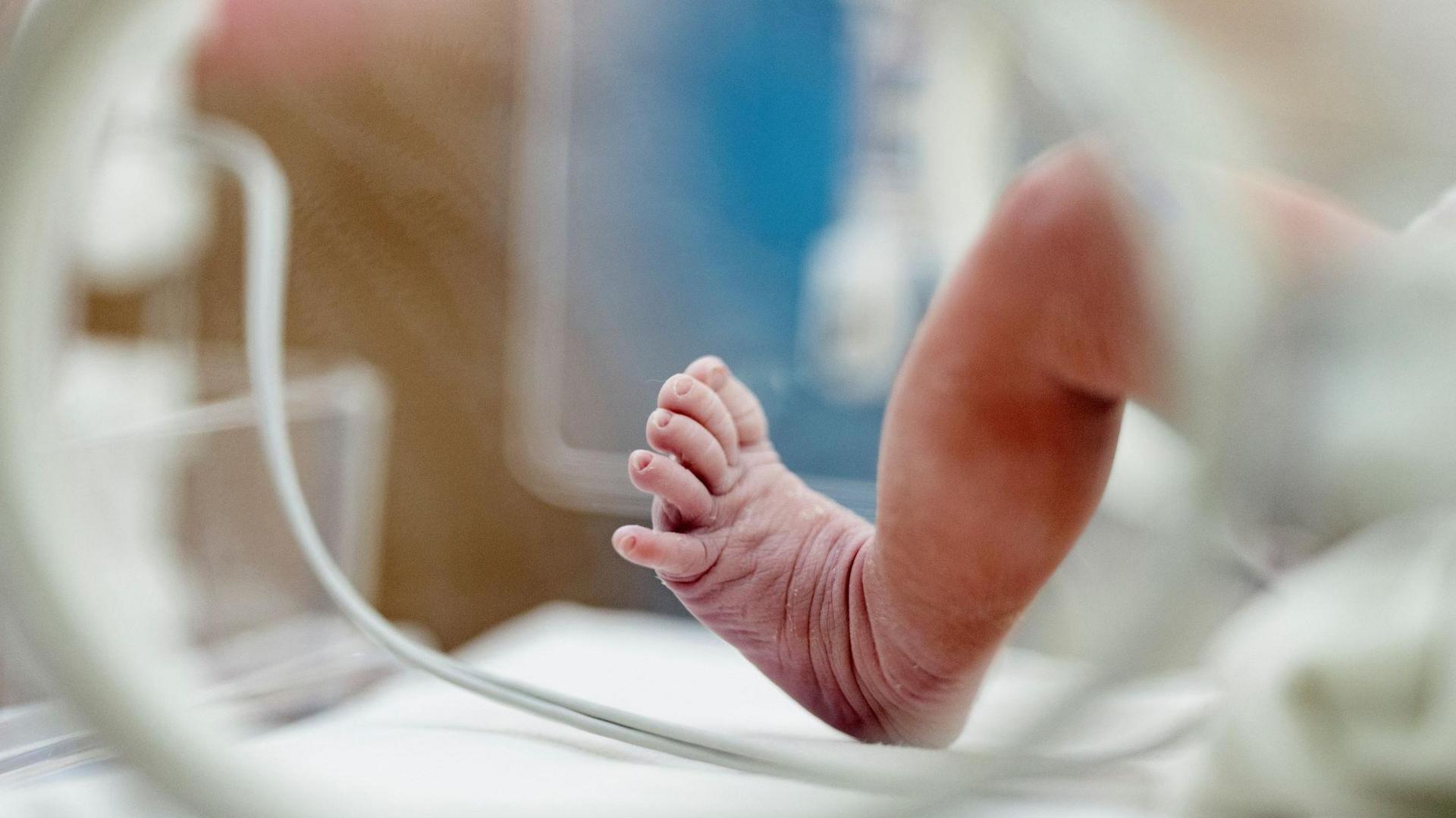Baby 'highly likely' to survive if born in hospital, inquiry told

The FAI is investigating the deaths of three babies at North Lanarkshire hospitals
- Published
It is “highly likely” that a baby who died two hours after his mother gave birth in the bathroom of her Lanarkshire flat would have survived if he had been born in hospital, a fatal accident inquiry (FAI) has heard.
Leo Lamont died at University Hospital Monklands on 15 February 2019.
The FAI is looking into the deaths of three babies, all of whom were said to have died “in circumstances giving rise to serious public concern”, at two North Lanarkshire hospitals between 2019 and 2021.
The death of Leo Lamont is the last of the three cases to be examined by Sheriff Principal Aisha Anwar and evidence began this week.
Why parents are reliving their baby-loss nightmares
- Published12 January 2024
Paramedic tells baby death inquiry of equipment gaps
- Published16 January 2024
Baby may have lived with earlier care, inquiry told
- Published22 January 2024
Improvements needed in baby death investigations
- Published27 February 2024
The court heard that he was born “extremely” pre-term at 27 weeks after his mother went into labour at home, ultimately giving birth on her bathroom floor.
Upon the arrival of paramedics, mother and baby were transferred to University Monklands Hospital where Leo was described as having “poor respiratory effort and tone”. Efforts to resuscitate Leo were eventually discontinued and he was placed with his parents for them to hold.
His cause of death was perinatal hypoxia, presumed placental abruption and extreme prematurity.
Professor Tracy Humphrey, an expert witness in midwifery, told the court that Leo would have had an 80% chance of survival if he had been born in hospital and given timely access to specialist neonatal services.
High risk pregnancy
The inquiry heard that Leo’s mother, Nadine Rooney, was classified as a high risk pregnancy due to a previous history of pre-term labour and the fact that she smoked. Ms Rooney told the court that during the early hours of 15 February, she awoke in the night with back and stomach pains which she described as “agony”.
Her partner and Leo’s father, Anthony Lamont, called the Princess Royal maternity assessment unit in Glasgow where a midwife advised Ms Rooney to take paracetamol and call back if symptoms did not improve.
Ms Rooney, who broke down in tears several times while giving evidence, said she could not recall specific details of the phone conversation because of the pain she was in but said: "I felt the midwife was not bothered and didn't want me to come in, because it was the middle of the night."
The inquiry also heard that she had exchanged Facebook messages with her mother where she described being “in agony and terrified”, and fearful that Leo “can’t come this early”.
Shona McPhee, the midwife who took the call with Ms Rooney, told the inquiry that Ms Rooney had reported “mild” back pain and that “nothing that was reported to me was suggestive of pre-term labour”.
Ms McPhee said she went through a checklist with Ms Rooney which included questions about contractions and pain, saying that the patient “sounded calm” and said the pain wasn’t constant or “crampy” in nature.
Asked about this phone call, Prof Humphrey said that “in retrospect” the back ache reported by Ms Rooney was a symptom of pre-term labour.
She said had this been identified as a possible pre-term labour presentation and Ms Rooney invited into hospital, it is “highly likely” Leo would have been born in hospital and given timely access to specialist services.
Ms McPhee added that "with hindsight and knowing the outcome" she wished she had told Ms Rooney to come into hospital "but the symptoms reported to me at the time were not indicative of pre-term birth".
'Something seriously wrong'
In her affidavit submitted prior to giving evidence, Ms Rooney said she told the midwife that her pain was “unbearable”.
Asked what the appropriate advice would have been if Ms Rooney had told the midwife she was in pain to that extent, Prof Humphrey said “to come into hospital for an assessment”.
“Because that degree of pain during a pregnancy would be a concern that there was something seriously wrong,” she said, later adding that is it “very unusual” for an expectant mother to make contact with hospital services in the middle of the night.
However, Ms McPhee told the court that Ms Rooney described her pain to be mild and not constant or crampy.
Asked whether Ms McPhee’s advice to take paracetamol and call back if things got worse was appropriate in these circumstances, Prof Humphrey said: “It would have been appropriate if that had been the description”.
However, Prof Humphrey added that the timing of the phone call, coupled with Ms Rooney’s previous pre-term labour and high risk category, would make it “reasonable” to have triggered some midwives to have invited her in for hospital assessment even if she had only described her pain as mild.
Prof Humphrey also said that pre-term labour is particularly difficult to diagnose at Ms Rooney’s stage of pregnancy.
The inquiry continues.